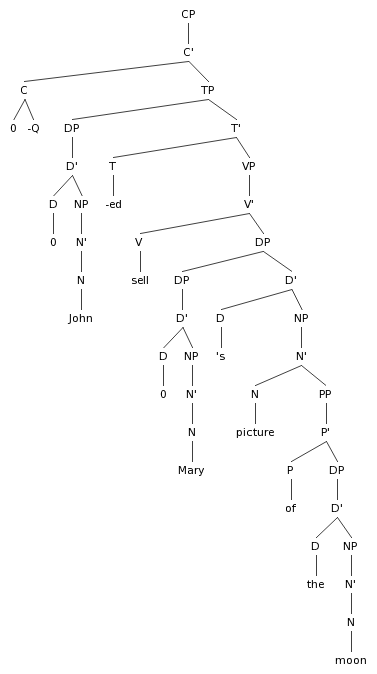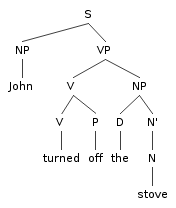Chapter 5
Draw a tree for:
- Abelard wrote a poem with Heloise in mind.
-
Right
- * Heloise in mind kept him company. (Can't be a subject.)
- * It was [Heloise in mind] that Abelard wrote a poem with. (can't be preposed/clefted)
- The red volume of obscene verse from Italy
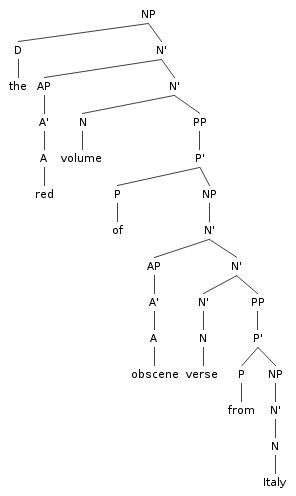
- The volume shocked the puritan soul of the minister with the beard quite throughly yesterday
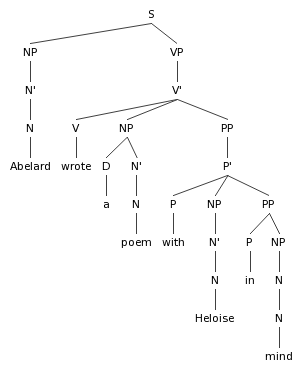

One argument for the the idea that in mind is a complement of with (obligatoriness):
-
Abelard wrote a poem with Heloise. (changes meaning)
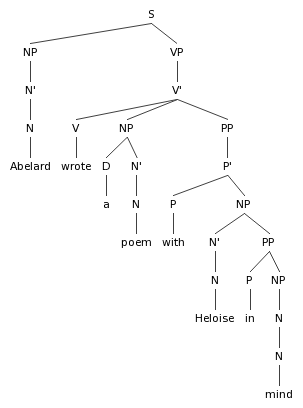
Arguments:
Chap 6
Theory
p. 99, (1)
For the following sentences, accept the given judgments. Explain whether the given judgment is predicted by the binding theory. For each example, discuss all principles that affect the coindexed NPs.
- * Fred i loves himi
-
Predicted by Binding Theory.
Principle B violation: A pronoun must be free in its binding domain;
him is not free. It is bound by Fred,
which is in the binding domain of him; that is, it is
in the same clause.
- * Hei thinks that Sue loves Fredi
-
Predicted by Binding Theory.
Principle C violation: An R-Expression must be free.
Fred is not free. It is bound by He.
Note: There is no Principle B violation.
The pronoun He is not bound.
Although it is coindexed with Fred
it is not C-commanded by Fred.
Therefore it is not bound by Fred.
- * Michael'si father loves himselfi
-
Predicted by Binding Theory.
Principle A violation: An anaphor must be bound in its binding
domain;
himself is not bound.
Although it is coindexed with Michael,
it is not C-commanded by Michael.
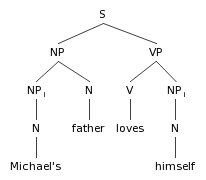
- * Fred'si fatherj loves himj
-
Predicted by Binding Theory.
Principle B violation: A pronoun must be free in its binding domain;
him is not free. It is bound by Fred's wife,
which is in the binding domain of him; that is, it is
in the same clause. (so this is really just like
example (1)).
- * Susani thinks that John should marry herselfi.
-
Predicted by Binding Theory.
Principle A violation: An anaphor must be bound in its binding
domain.
Although herself is bound (it is coindexed with Susan,
and C-commanded by Susan)
it is not bound within its binding domain
(its minimally containing clause).
- * John thinks that Susani should kiss heri.
-
Predicted by Binding Theory.
Principle B violation: A pronoun must be free in its binding domain;
her is not free. It is bound by Susan,
which is in the binding domain of her; that is, it is
in the same clause.
- * I spoke to himi in Beni's office.
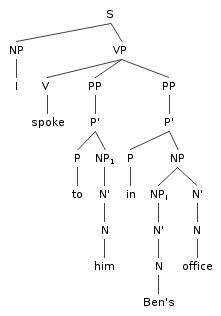
and replacement
A syntax tree is a notation for writing down claims about a sentence or phrase. This .problem is about the claims that trees make about how anaphoric elements should behave.
- On the basis of our assumptions
about the anaphoric element one, which
part or parts of the Noun Phrase a World War I collection
of poems does the following tree claim can be replaced by
one? [Make sure your answer is complete.
If there is more than one part of the phrase that should be
replaceable by one according to the tree, list
multiple parts. However,
you do not need to consider the internal structure
of phrases that are represented by triangles.]
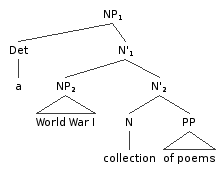
- On the basis of our assumptions
about the anaphoric element one, which
part or parts of the Noun Phrase a World War I collection
of poems does the following tree claim can be replaced by
one?
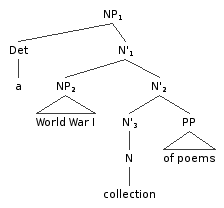
- Now construct some examples that argue for one tree and against the other based on the actual observed behavior of one.
Summary of results:
- The basic assumption:
- Anaphoric elements replace constituents
- one replaces N-bars.
- If a PP is attached as a complement its sister is not an Nbar and can NOT be replaced by one.
Other anaphoric elements:
-
Do so: replaces Vbars
- John put a rug in the washer and Sue did so too. [Replaces put a rug in the washer]
- * John put a rug in the washer and Sue did so in the sink. Does this argue that in the washer is a complement or an adjunct?
-
VP-ellipsis: Empty string replaces VP
- John put a rug in the washer and Sue did too.
- * John put a rug in the washer and Sue did in the sink.
- Who might be going to the cinema on Tuesday?
- John might be. [∅ = going to the cinema on Tuesday.]
- John might. [∅ = be going to the cinema on Tuesday.]
- John might on Wednesday. [∅ = be going to the cinema]
- John might be on Wednesday. [∅ = going to the cinema]
-
so: replaces Abars
- John is very fond of Mary in some ways, but less so in others [so = fond of Mary]
- John is very fond of Mary, but less so of Jean [so = fond]
-
so: replaces Pbars
- John is always at odds with his colleagues, but he is less so with his friends. [so = at odds]
Criterion
Evaluate this claim: the following sentence under the indicated coindexing, is a theta-criterion violation.
- Johni believes that hei is a genius.
False. Read theta-criterion (p. 171)
- Each argument is assigned one and only one theta role.
- Each theta role is assigned to one and only one argument.
- Each argument position of a predicate is assigned one and only one theta role.by the predicate
- Each theta role of a predicate is assigned to one and only one argument of the predicate.
Important:
-
The theta-criterion constrains the relationship
between theta roles and syntactic constituents
that fill argument positions of a predicate.
Claim: (1) is still a theta-criterion violation. The NPs John and he fill the same theta role for the predicate is. And also for the predicate thinks. True or false?
False again. The theta criterion is about subjects and complements of a predicate. It requires that all of a predicate's theta roles be used up by the subject and complements of the predicate, and that the subject and complements all receive theta roles. John is the subject of the predicate thinks. Thus the theta-criterion requires that thinks assign John one and only one theta role. It does:
-
think: NPi [ __ CP[-Que,+Fin]j]
| experiencer | proposition |
| i | j |
-
be: NPi [ ___ NPj]
| theme | goal |
| i | j |
Observations:
- The Theta-criterion does not preclude coreference between NP arguments, even between arguments in the same clause. But each NP must receive its own theta role from the predicate that it is an argument of. Thus NPs in separate clauses must receive tehta roles from separate predicates.
- The theta criterion does preclude a predicate from assigning theta roles to NPs other than its OWN subject and complements. For example, a verb may not assign roles to NPs in another clause.
- The theta criterion is not only about verbs.
It is about ANY head and its complements and/or subject.
- * The book of poetry of prose
- * John is fond of Mary of Sue.
- The theta criterion is not only about NPs
It is about ANY complements and/or subject.
- John thinks [CP that Mary is a genius.]
- [CP That Mary is a genius] is obvious.
- There is an exemption for subject position.
Roleless expletives occur in subject position, inserted between
D-structure, where the theta-criterion applies, and the surface,
where the Extended Projection Principle applies.
-
obvious: [ __ CP[-QUE,+FIN]i ]
proposition i - It is obvious that Mary is a genius.
- * That Mary is a genius is obvious that John is a genius.
- That he married Mary proves that John is a genius.
-
prove: CP[-QUE,+FIN]i [ __ CP[-QUE,+FIN]j ]
proposition, source proposition, theme i j - Prepositional phrase complements. Roles are assigned
to directly to the ``referents'' of DP/NPs and CPs. In
contrast, with PP complements, roles are assigned to the
objects of the preposition:
- John gave the book to Mary.
-
give: NPi [ __ NPj [PP to NPk]]
agent theme goal i j k - Optionality. The theta criterion requires to
posit separate lexical entries in
those quite common cases where a complement is optional:
- John ate the apple.
- John ate
-
eat: NPi [ __ NPj]
agent theme i j The entry for the second sentence would look like this:
-
eat: NPi [ __ ]
agent i
- John gave the book to Mary.
Particles
- (1) John turned off the stove.
Constituency arguments:
- (2) *It was off the stove John turned. [with the meaning: John extinguished the stive light.]
- (3a) * Off which stove did John turn?
- (3b) * The stove off which John turned was very old. [Compare: The shelf off which John took the book was very high.]
- (3c) The stove which John turned off was very old.
- (4a) * John turned off the stove and on the lamp.
- (4b) The cat climbed off the stove and under the table.
The do-so and VP deletion tests do not help us here, because they will only establish the constituency of VPs.
- (5)
- -- What did John turn off?
- -- * Off the stove?
There is one other important argument which is not really a constituency argument. Passsivization is possible from the site after off:
- (6) The stove was turned off by John,
Identify the violations of the theta criterion in the following ungrammatical sentences, if any. If you claim the theta-criterion is not responsible for the ungrammaticality, you are hereby invited to speculate on what is:
- * John arrived in Boston on Monday on Tuesday.
- * John kicked that Bill was laughing.
- * Sue love for Harry to leave.
- * John thinks that left.
- * Sue devoured.
- * was obvious that the Theta-criterion had been violated.
- * John arrived in Boston on Monday on Tuesday.
No. Theta criterion does not apply to adjuncts. Problem is semantic. - * John kicked that Bill was laughing.
Yes. There is no second theta role for kick appropriate for a proposition. - * Sue love for Harry to leave.
No. Problem is lack of tensed or agreeing verb. - * John thinks that left.
Yes. left assigns a theta role to an external argument, which is missing. - * Sue devoured.
Yes. Devour assigns a theta role to an internal argument, which is missing. - * was obvious that the Theta-criterion had been violated.
No, it wasn't. Violates the Extended projection principle, which requires all clauses to have subjects.
